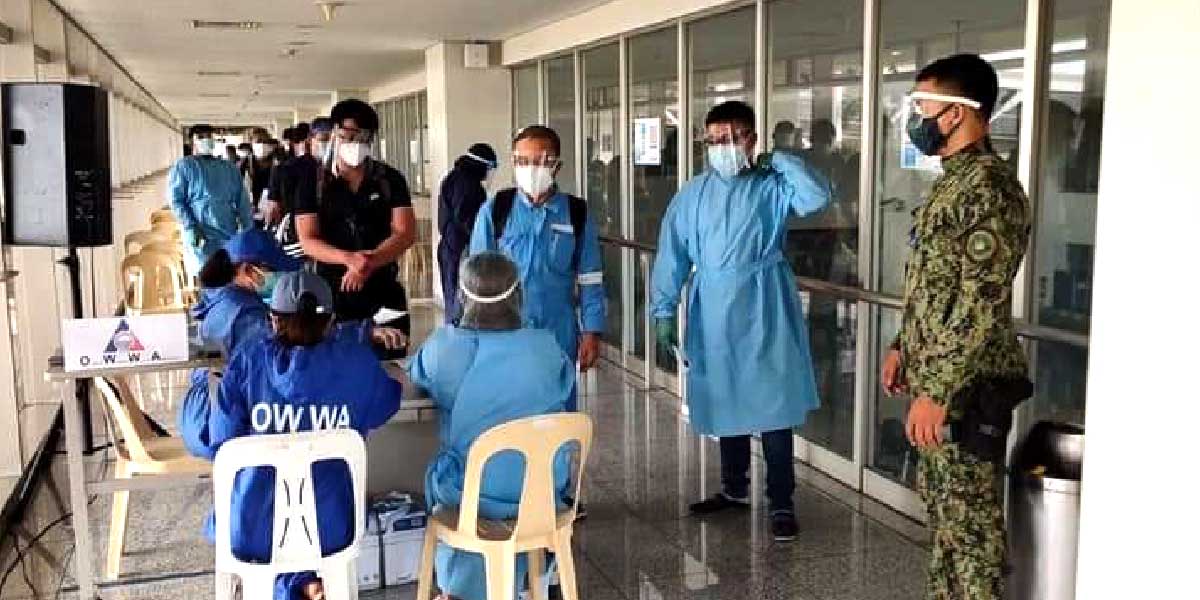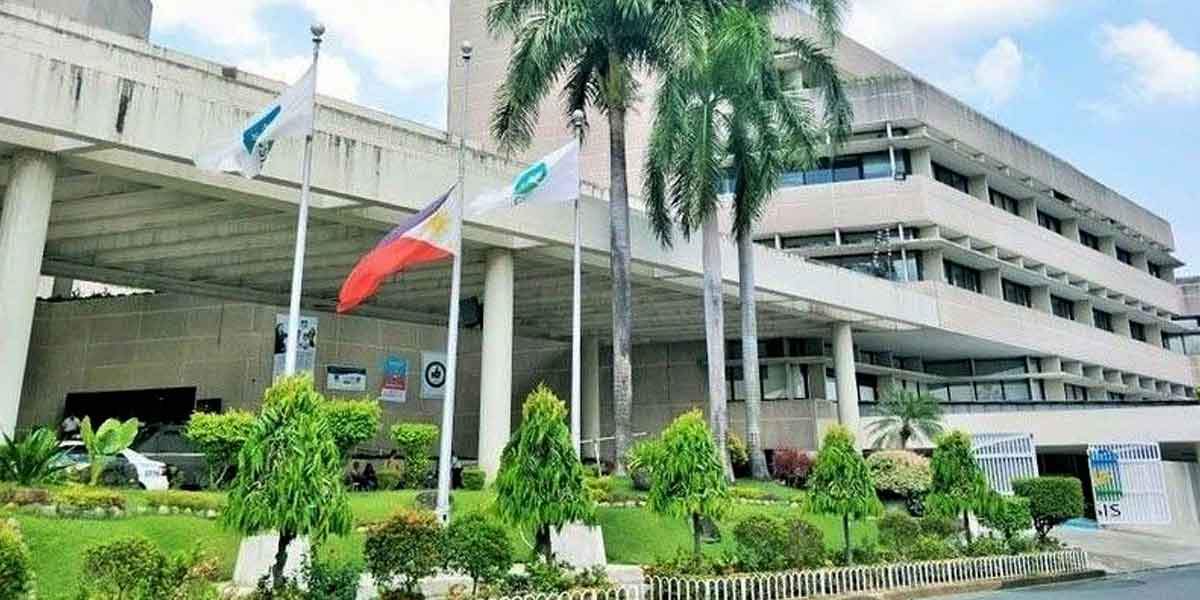
By Joseph B.A. Marzan
Residents of Iloilo province who return to their homes, as well as Authorized Persons Outside of their Residence (APORs), will be under close monitoring amid the coronavirus disease 2019 (COVID-19) pandemic.
The move is contained in a new Executive Order (EO) issued by Governor Arthur Defensor Jr. this week.
EO No. 155, series of 2021 issued on May 12, 2021 is the latest iteration or version of the province’s edicts under the Modified General Community Quarantine (MGCQ) regime.
The new EO supersedes EO No. 183, series of 2020, first issued on August 17, 2020, and its amendments that were issued thereafter.
It also aligns the province’s MGCQ policies with the national government’s intensified prevention, detection, isolation, treatment, and reintegration (PDITR) strategy of managing COVID-19 transmission and possible surges.
Defensor said in an interview on Friday that it was also based on the province’s low Average Daily Attack Rate (ADAR), which is at 0.926, according to data by the Iloilo Provincial Health Office (IPHO) from April 25 to May 8, 2021.
ADAR refers to the number of cases in the province over a two-week period per 100,000 population, divided by its total population.
Prior to the interview, Defensor met with municipal mayors, health officers, and disaster and risk reduction officers to discuss the new EO for implementation and the expectation of a possible surge in cases.
EO No. 155 implements the following measures:
– COVID-19 vaccination of the targeted eligible population, under the Provincial COVID-19 Vaccination Deployment and Immunization Plan 2021-22 (COVAC PLAN 21-22);
– Strict observance of the 3M–Strategy— “Mag Maskara, Mag Distancia kag Manghinaw”;
– Strict observance of Minimum Public Health Standards in the movement of persons, transportation, establishments and other aspects of public life;
– Maintenance of strict health protocols and quarantine measures for inbound travel to the Province;
– Strict regulation of social/public events and gatherings;
– Intensified and timely barangay monitoring, detection and isolation/quarantine of COVID-19 contacts, suspect, probable and confirmed case;
– Fast and efficient contact tracing, and the creation of Provincial Contact Tracing Team to augment the capacity of the Local Contact Tracing Teams;
– Strategic and extensive COVID-19 testing, and creation of the Provincial Testing Team to augment the capacity of the City or Municipal Health Offices or Rural Health Units;
– Adoption of Reverse Isolation as a frontline strategy to protect vulnerable persons, and strengthening of the LIGTAS COVID-19 Centers of the Province, city/municipalities and barangays; and
– Implementation of the Project Socio-economic Healing and Recovery of the Province (SHARP) and Project Program for the Resilience of Iloilo in Mind and Emotion (PRIME) as frontline strategies for social healing and economic recovery towards reintegration.
WHAT’S NEW?
While the new EO reiterated previous policies already in place under the MGCQ regime, a new addition is the explicit guidelines for APORs and Returning Residents, previously known as Locally-Stranded Individuals (LSIs).
For the purposes of inbound travel regulations, EO No. 155 considers the following to be APORs:
– Health and emergency frontline services personnel;
– Government officials and government frontline personnel;
– Duly authorized humanitarian assistance actors (HAAs);
– Persons traveling for medical or humanitarian reasons, especially those transporting medical supplies and laboratory specimens related to COVID-19, and other relief humanitarian assistance;
– Persons going to and from the airport;
– Persons crossing zones for work or business permitted in the zone of destinations, or activities as may be authorized by the IATF, and going back home; and
– Public utility vehicle operators; and
– Drivers and crew of forwarding or delivery service in the conduct of trade, delivery of cargo or social or humanitarian services, fishing or marine activities, scientific or academic pursuit, with monitoring by the Philippine National Police (PNP).
Under the regulations set by the new EO, APORs shall:
– Not be required negative Reverse Transcription-Polymerase Chain Reaction (RT-PCR) result for travel to the Province;
– Only be allowed entry if they are asymptomatic;
– Be examined for COVID-19 symptoms upon arrival, and those found with symptoms shall be admitted to the appropriate facility for isolation or quarantine and treatment; Provided that, those without symptoms shall be free to proceed to their destinations and travel within the Province;
– Be subject to health protocols and quarantine measures administered by the receiving agency, office, establishment, or facility in the Province;
– Be coordinated with the City or Municipality on their arrival, and report on the administration of health protocols and quarantine measures by their receiving agency, office, establishment or facility;
– Be required to present travel order and travel itinerary if they are from the national government agencies and other government offices or corporations;
– Be required to present their company’s or office’s travel order if they are from the private sector; and
– Be required to present any of the following valid government IDs for entry to the Province:
i. Voter’s ID Card issued by the Commission on Elections (COMELEC);
ii. Philippine Passport;
iii. Unified Multi-Purpose ID (UMID) Card;
iv. Postal ID Card;
v. Tax Identification Number (TIN) Card; or
vi. Any government issued ID showing proof of residence.
The new EO also provided that returning residents shall:
– Only be allowed entry if they are asymptomatic;
– Be examined for symptoms upon arrival, and those found with COVID-19 symptoms shall be admitted in the appropriate facility for quarantine and treatment;
– Be required valid government ID showing proof of residence, same as those required for APORs, or their counterpart issued by a foreign government for returning Overseas Filipino Workers (OFWs);
– Be required to show Notice of coordination (NOC) with the City or Municipality of destination; and
– Be required negative RT-PCR test result issued within 72 hours before travel to the Province, provided that:
i. They shall be subject to health monitoring by their respective City or Municipal Health Officers and Barangay Health Emergency Response Teams (BHERTs) for 10 days from arrival;
ii. Those who develop symptoms within the 10-day period shall be admitted to the appropriate facility for quarantine and treatment until recovered.
ADDITIONAL MEASURES
For both groups, the new EO also explicitly empowers city or municipal mayors in the province to impose additional or adjusted health protocols and quarantine measures.
Defensor said the province will not bar travel to and from Negros Occidental and Bacolod City amid the growing number of COVID-19 cases there.
He cited data at the Port of Dumangas composed mainly of APORs and returning residents to other parts of Panay Island.
“There is a more critical or higher situation in Negros Occidental and Bacolod, and we have travelers coming in. In the profile of the passengers coming in from Negros Occidental through the Port of Dumangas, it is the whole of Region 6, Antique, Capiz, Aklan, and Iloilo passing there. They are mostly attendants and drivers of cargo trucks, because most of our ROROs are cargo trucks, but also private vehicles which use the RORO. But the people mostly crossing Dumangas and Negros are crossing because of their work, like technicians, agents, businessmen. In other words, they are APOR, which are exceptions to the rule. They can do inter-zonal travel from the beginning,” Defensor said.
Persons returning to their families who may be considered APORs will also be monitored by the BHERTs and local police.
“There are those going home to their families, because they are APORs, meaning that you cannot stop their travel. So what do we do? We have to return the monitoring to the barangay level, that our APORs should be subject to the health protocols of the establishment, the office, or facility which accepts them,” he said.
City and municipal governments can make their own edicts as an extension of EO No. 155.
“They can do that, but this EO will do. We have been doing that for a long time, and that provision has been in our executive order. The provincial quarantine team has a tracker because they interview APORs, that’s why we would know their status. That is our direction with regard to reducing the risk from travelers from Negros Occidental going through our Dumangas Port,” Defensor added.
Data from the IPHO as of May 14, 2021 indicated that Iloilo province has a total of 6,486 COVID-19 cases, (502 active cases, 178 deaths, and 5,806 recoveries).


















